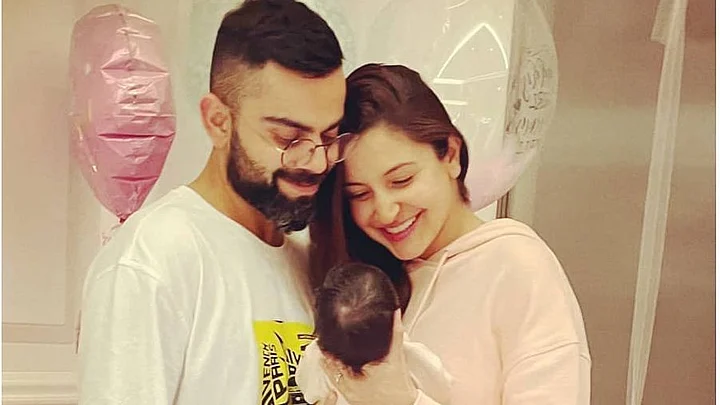Anushka Sharma posted a statement on Instagram after pictures of her and Virat Kohli’s daughter Vamika went viral. She wrote that the couple’s stance on clicking pictures of Vamika remains the same and asked everyone to not click or publish pictures of her.
A broadcaster of the ongoing India-South Africa series revealed Vamika's face on video when Anushka was holding her as they cheered for Virat from the stands. Anushka added that they were ‘caught off guard’ at the stadium.
She wrote, “Hi guys! We realise that our daughter’s images were captured at the stadium yesterday and widely shared thereafter. We want to inform everyone that we were caught off guard and didn’t know that the camera was on us. Our stance and request on the matter stays the same. We would really appreciate if Vamika’s images are not clicked/published for reasons we have explained earlier. Thank you!”
Virat Kohli and Anushka Sharma Seek Privacy for Vamika
Virat Kohli and Anushka haven’t shared pictures of Vamika’s face on social media and had also issued a public statement revealing their reasons for the same. The couple had informed, “We have decided as a couple to not expose our child to social media before she has an understanding of what social media is and can make her own choice."
In December, Anushka had posted a statement on Instagram reiterating their stand on Vamika’s privacy and had thanked the media and paparazzi for respecting their wishes. “We are deeply thankful to the Indian paparazzi and most of the media fraternity for not publishing pictures/videos of Vamika. As parents, our request to the few who carried the images/video will be to support us going forward,” the statement read.
She further wrote, “We seek privacy for our child and would like to do our best to give her a chance to live her life freely away from media and social media. As she is older, we cannot restrict her movement and hence your support is needed so kindly practice restraint in the matter.”
The Legal Perspective on Privacy for Children
India currently does not have a robust mechanism for protection of privacy of children, which would be relevant to the sharing of photographs of celebrities' kids.
This does no mean that there are no protections at all - however, these are specialised legal provisions which can't be used for everyday photographs. For instance, Section 67B of the Information Technology Act punishes the publication of photographs which depicts children in an obscene or indecent or sexually explicit act. Section 23 of the Protection of Children from Sexual Offences (POCSO) Act prohibits the media from publishing anything which would reveal the identity of a child victim of sexual abuse. Section 74 of the Juvenile Justice Act prohibits the publication of anything which would reveal the identity of a child who is a victim or perpetrator of a crime, or even a witness to a crime.
The failure to have legal protections for the privacy of children is technically a violation of India's obligations under the UN Convention on the Rights of the Child, which was ratified by India in 1992. Under Article 16 of the CRC:
"No child shall be subjected to arbitrary or unlawful interference with his or her privacy, family, home or correspondence, nor to unlawful attacks on his or her honour and reputation."
The law is supposed to grant children a right to protect them from any such interference or attacks – as India doesn't automatically adopt international treaties into domestic law, Parliament needed to enact a legislation to give effect to this Article of the CRC.
The draft Data Protection Bill proposed in 2019 and recently reviewed by a Joint Parliamentary Committee could perhaps be used to address this gap, but the bill still needs to be reintroduced in Parliament and passed before this becomes an option.
Section 16 of the draft bill says that the personal data of a child has to be processed in a manner that protects the rights of the child. This will involve data fiduciaries (including any publishers of photographs of celebrity kids) having to verify the age of a child and obtain the consent of their parent or guardian before processing their data (which can be interpreted to include uploading/sharing/publishing photographs of a child).
(At The Quint, we question everything. Play an active role in shaping our journalism by becoming a member today.)
